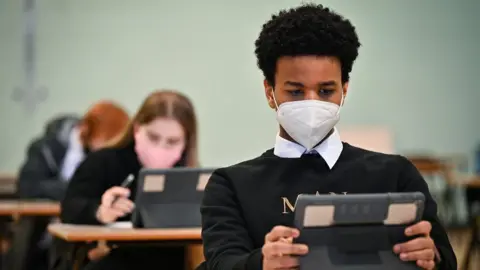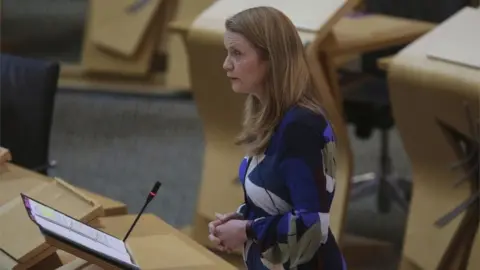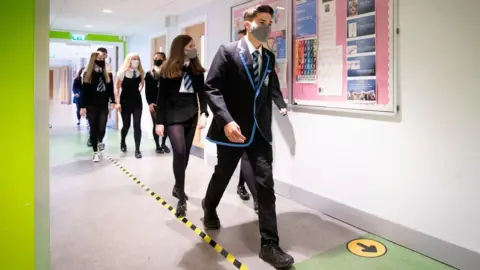Scottish exams body to be reformed amid grades row
 Getty Images
Getty ImagesTwo of Scotland's education authorities are to be reformed amid criticism of the plans put in place to replace school exams.
The Scottish government said the role, remit and purpose of Education Scotland and the Scottish Qualifications Authority (SQA) would be examined.
The announcement was made by Education Secretary Shirley-Anne Somerville.
She had earlier said she would take "full responsibility" for the new system.
The SQA is responsible for delivering the exam diet for older pupils in Scottish schools every year, while Education Scotland is tasked with improving the quality of the country's education system.
The SQA in particular has faced heavy criticism, with some opposition politicians calling for it to be scrapped and replaced.
Its chief executive, Fiona Robertson, said the organisation would play a full part in the review and remained focused on "working with the whole education system to support our young people to get the qualifications they deserve this year".
Speaking in the Scottish Parliament on Thursday afternoon, Ms Somerville said reforms to the two education bodies would form part of "wide-ranging plans for education recovery" over the next 100 days and beyond.
And she said the announcement showed "our determination to deliver improvements with pace and urgency".
She added: "I am open to considering what further reform is necessary, with the clear purpose of doing all we can to improve outcomes for children.
"This includes reducing variability in the outcomes children and young people achieve across the country".
The announcement came shortly after First Minister Nicola Sturgeon insisted she had full confidence in the SQA while admitting that the system that had been drawn up was "not perfect".
Much of the anger has centred on the appeals process for pupils unhappy with their grades, which could see their final results revised down as well as up.
Opposition parties have said this would make decisions on whether to appeal or not a "perverse gamble" for pupils.
The alternative qualifications model was introduced after formal exams were cancelled for a second year running to the Covid pandemic.
Grades are to be awarded on the basis of "teacher judgement of evidence of learner attainment".
But the second national lockdown at the start of the year meant most of the assessment work done by teachers has come in the final weeks of term.
This led to claims that the system was effectively "exams by another name" which were being conducted with less preparation and often in a more intensive time period.
 PA Media
PA MediaSome pupils have said that going through the new system was more stressful than the traditional exam process.
The Scottish government was forced to U-turn last year and upgrade the results of tens of thousands of pupils after an outcry over how the grades had been awarded.
The Scottish Conservatives' education spokesman Oliver Mundell said the SQA "isn't fit for purpose and must be axed".
"The SNP can't have it both ways. Nicola Sturgeon said she had full confidence in the SQA, yet a couple of hours later her education secretary announces that she wants to reform the SQA after its continued failures.
"That will hardly inspire confidence among pupils, parents and teachers who the SNP have continually let down."


Until this afternoon, the SNP government was alone in supporting the SQA and Education Scotland as they stand.
Every other political party has been calling for them to be reformed. Parliament passed a motion saying they were not fit for purpose back in February.
In an interview this morning, the education secretary said she had full confidence in the SQA and during First Minister's Questions at lunchtime, Nicola Sturgeon said the same.
Two hours later, plans were announced to reform both organisations.
Shirley-Anne Somerville is now walking the line between saying the assessment process overseen by both of these institutions is credible and fair - and at the same time saying they need to be fundamentally changed.

Scottish Labour accused the government of "sticking their head in the sand over the ongoing exams crisis", and said that a "vague commitment" to a future review of the SQA does not go far enough.
The Scottish Greens tabled an amendment in the Scottish Parliament - which was defeated by 60 votes to 59 - urging MSPS to acknowledge the "additional stress and anxiety felt by students, teachers, parents and carers as a result of the 2021 alternative certification model".
The party says this year's model should adopt a no-detriment policy - meaning grades cannot be lowered - and has criticised the "repeated underperformance of the SQA".
The National Union of Students (NUS) Scotland backed those calls "to ensure no student is left academically disadvantaged by an appeal, and that exceptional circumstances are taken into consideration".
 PA Media
PA MediaThe EIS teaching union's general secretary, Larry Flanagan, welcomed the review, and said Education Scotland should be "free to challenge government, rather than being an extension of the civil service".
He added: "Our members have often found the SQA to be too remote from classroom practice and a significant generator of additional workload for teachers."
The NASUWT union said the reforms must be "more than a cosmetic exercise" while NSPCC Scotland called for more focus on children's emotional wellbeing and mental health.
Speaking about the appeals process, an SQA spokesman said: "We have listened to the views of young people in developing this year's appeals service. For the first time young people have a free and direct right of appeal on a broad range of grounds.
"Representatives from the Scottish Youth Parliament have been at every meeting of the NQ Group 2021 over the last six months. The Scottish Youth Parliament also runs our Learner Panel, which gathers the views of learners from across Scotland.
"All communication from the NQ Group 2021, including those directly for learners, are agreed with the Scottish Youth Parliament and they have been instrumental in the communications from the NQ Group to learners."
Cameron Garrett, convenor of the education committee on the Scottish Youth Parliament, is the only young person on the NQ21 group.
He told Radio Scotland he did not feel listened to, and that his voice was "drowned out". He said the views of young people had to be considered more.


